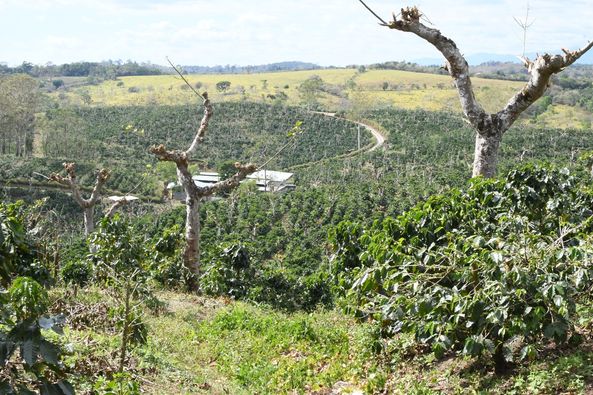

cacao pod

try birding



A guest post for Earth Day from Scott Weidensaul, one of our “Voices for the Birds” (http://www.scottweidensaul.com)
In January, I had the opportunity to spend a week in Nicaragua, visiting a number of the farms that supply Bird Friendly® coffee to Birds & Beans – an experience that drove home the critical importance of such Smithsonian-certified shade coffee farms to the survival of migratory birds.
Much of our time was spent in the country’s northern highlands, a region of exceptional avian diversity, where Birds & Beans is partnering with UCA San Juan del Rio Coco, a cooperative of more than 400 small family farmers, all growing USDA organic coffee, 60 percent of which is also certified Bird Friendly®.
My guide was Jefferson Shriver, who with his wife Gabriela Narvaez runs Gaia Estate, also a Birds & Beans supplier. We met with the leadership of UCA San Juan, including their general manager Griselda Jarquín Lopez, and learned that the cooperative has decided to become 100 percent Bird Friendly® within three years – a significant step for this large, successful operation, which ships more than 2.5 million pounds of coffee each year.
I also had a chance to see first-hand how important the traditional shade coffee farms of this region are to migratory birds. Whether one is driving north from Managua, or looking at the region from space via Google Earth, you’re struck by the realization that the highlands around San Juan del Rio Coco are an immense island of quality bird habitat, surrounded by denuded cattle pastures, grain fields and sun coffee monocultures. In the highlands, though, traditional shade coffee farming has preserved an oasis for birds.
I was expecting farms that looked like, well, farms. Instead, the Bird Friendly® certified farms of producers like Marvin Venega look like almost untouched forest – high, complex canopies of native trees, draped with vines and spangled with orchids. In the shade of these forests, Venega and his neighbors grow not just coffee, but also cacao, vanilla, starfruit, cinnamon and a host of other crops – a system that is centuries old.
The habitat they protect simply drips with birds. We found great, rolling flocks moving through the woods. There were migrants like Philadelphia, yellow-throated and warbling vireos; yellow, chestnut-sided and Wilson’s warblers; summer tanagers and rose-breasted grosbeaks. Mixed with them were flamboyant resident species like emerald toucanets, blue-crowned motmots and masked tityras. Baltimore orioles from the north fed beside yellow-backed orioles, and Tennessee warblers were everywhere. It was paradise for a birder like me, and I hardly knew which way to look.
The coffee you drink makes a real, demonstrable difference for the birds that migrate to Central America. Because of the premium price they receive for Bird Friendly® coffee, farmers like Marvin Venega are actually restoring degraded habitat. Marvin proudly showed us an old corn field where, with the cooperative’s support, he has planted thousands of saplings of native trees and shrubs. Within a few years, this too would become vital habitat for migrants like blue-headed vireos and western wood-pewees.
The habitat preservation that every bag of Birds & Beans coffee makes possible isn’t happening just in the northern highlands. We wrapped up our trip at Gaia Estates, not far from the Pacific coast, which Jefferson and Gabriela have turned into a model of organic, Bird Friendly® habitat.
At daybreak, we sat on the deck of their cabin listening to flocks of parrots and parakeets screeching overhead. Dozens of western tanagers mobbed fruiting trees, while ruby-throated hummingbirds – perhaps the same ones that nest at our home in Pennsylvania – flitted from flower to flower. The woods were filled with hundreds of yellow warblers, and the more open areas were alive with scissor-tailed flycatchers and western kingbirds.
Jefferson and Gabriela are now Birds & Beans’ official representatives in Latin America, helping us forge partnerships not only with farmers in Nicaragua, but in countries as far afield as Peru and Colombia – and in the process, to safeguard the kind of habitat that birds we all love must have to survive.